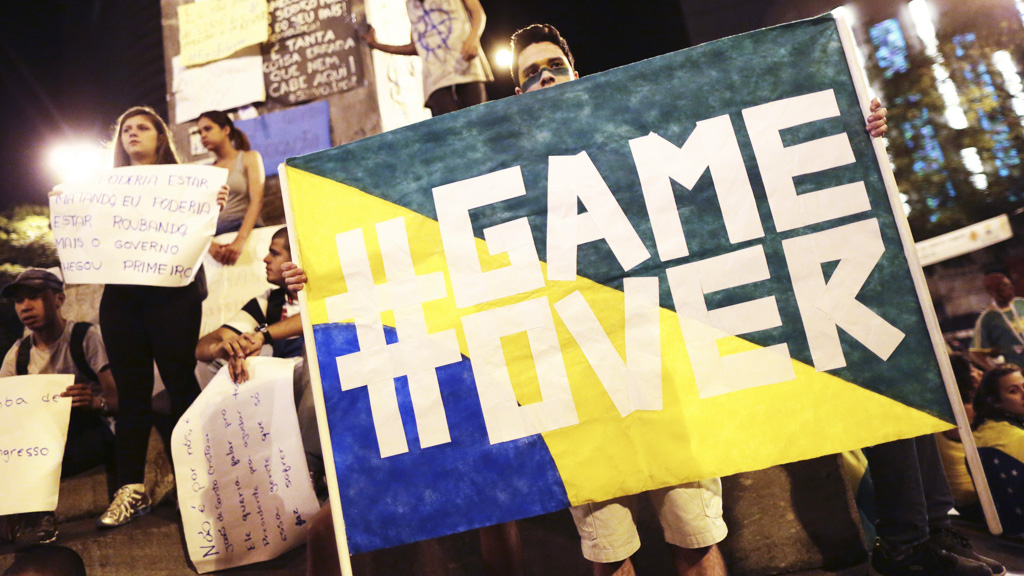Can Brazil put its football-fuelled awakening to sleep?
The Confederations Cup football tournament in Brazil has sparked anti-government, anti-corruption protests across the country. Will President Rousseff’s concessions be enough to stem the revolt?

There can have been be few teams capable of ending Spain’s 29-match unbeaten run, writes Channel 4 News producer Thom Walker. Late on Sunday, however, Brazil’s players silenced their critics, beating the reigning world and European champions emphatically with a 3-0 victory in the Confederations Cup final, as the crowd sang “The giant is back.”
But football has struggled to make the front pages even in Brazil this last month.
At first, few outside the country paid much attention. In early June, several Brazilian cities prepared to increase local bus fares by a little over six pence. Some small protests followed.
It was a seemingly local story, a minor blip that would do little to alter the widespread perception of Brazil as Latin America’s fun-filled economic powerhouse, steamrolling its way into the global big leagues.
Yet within a matter of days, the situation had morphed into a national crisis – a crisis that brought hundreds of thousands onto the streets, forced the government into major concessions, and prompted observers to question whether or not Brazil really was prepared to host the World Cup next year.
In all, more than a million people protested in cities from Fortaleza, in the far north east, to the capital Brasilia. Some crowds turned violent, numbers swelled, and authorities struggled to keep control as the world watched – all while the country was trying to prove its worth on the international stage with a World Cup rehearsal.
The stage was set and the world was watching, but the lead star was fluffing her lines.
Rallying cause
So how did a seemingly minor grievance become a national flashpoint for the largest anti-government protests in three decades?
The anger that erupted was not simply over price hikes. Rather, it provided many Brazilians with a cause around which to rally and voice long-standing grievances against their government.
The stage was set and the world was watching, but the lead star was fluffing her lines.
Like much of Latin America, Brazil had been run by a military dictatorship (from 1964 – 1985), but the transition to democratic rule was relatively peaceful. After weathering the debt crises of the 1990s, which ravaged the region’s economy, the country boomed in the early 2000s.
Despite sluggish growth in the last two years, Brazil still overtook Britain as the sixth largest economy in the world, while more than 31 million people have entered the middle class in the past decade. The problems of poverty and security, as seen across the region, had by no means been eradicated but the country appeared to be on the right track.
In pictures: Brazil protests, from the favelas to the Copacabana
Land of ‘know-who’
For many, though, economic progress was not enough. As Jorge Castañeda observed: “Democracy did little to eradicate the region’s secular plagues: corruption, weak rule of law, and concentration of power in the hands of a few.”
It is this concentration of power that has spurred on many protesters, particularly those from the middle classes. An “awakening”, as they called it, fuelled in part by a growing sector of the population who felt they deserved a say in their country’s politicis but who had none. “Brazil” remained, as sociologist Roberto Da Matta noted, “not the land of know-how, but of know-who”.
The unrest was not limited to the middle classes. As the days wore on, more and more people from the country’s impoverished favelas joined in, marching down the hillsides to join the crowds.
The complaints from so many were the same. As one mother from Rocinha, the biggest slum in Rio, told me: “There is simply not enough investment in health and education up here.” Gesturing down the winding streets, Maria Carvalho, who said she had joined the protests herself, added: “Things have improved, sure, but we’re still poor.”
‘Love football, hate Fifa’
Yet this was also about the murkier side of football. The football-mad country had rejoiced at the chance to host the World Cup, a competition it has won a record five times. Soon the lofty promises made by former President Luis Ignacio Lula da Silva, promising transparency and a lasting legacy for the country’s poor, appeared to be falling short.
As World Cup winner turned politician Romario wrote: “Investment in cities hosting World Cup matches was prioritised over the people’s needs. Money was channeled predominantly towards sport projects, at the expense of health, education and safety.”
Brazilians have decided not to allow their sport to be used any more as an excuse for humiliating the many and enriching the few. Eduardo Galeano
Meanwhile the mighty Fifa announced an expected $2bn profit from the competition, as Brazil’s costs began to spiral, making it the tournament the most costly in history. With protests gathering momentum across the country, demonstrators held placards aloft reading “Love football, hate Fifa” and “A cup for whom??”
It is still a year until the World Cup kicks off, but it seems set to be a bumpy ride. President Dilma Rousseff has won plaudits for her handling of the crisis. She agreed to meet protesters, cancelled the bus fare hikes, and vowed to address the issue of corruption, opening a debate on political participation.
As a former student radical herself who was tortured by the military government, she knows that an awakening cannot be easily put to sleep. As writer Eduardo Galeano put it: “Brazilians, who are the most football-mad of all, have decided not to allow their sport to be used any more as an excuse for humiliating the many and enriching the few.”
Channel 4 News producer Thom Walker was in Brazil covering the protests